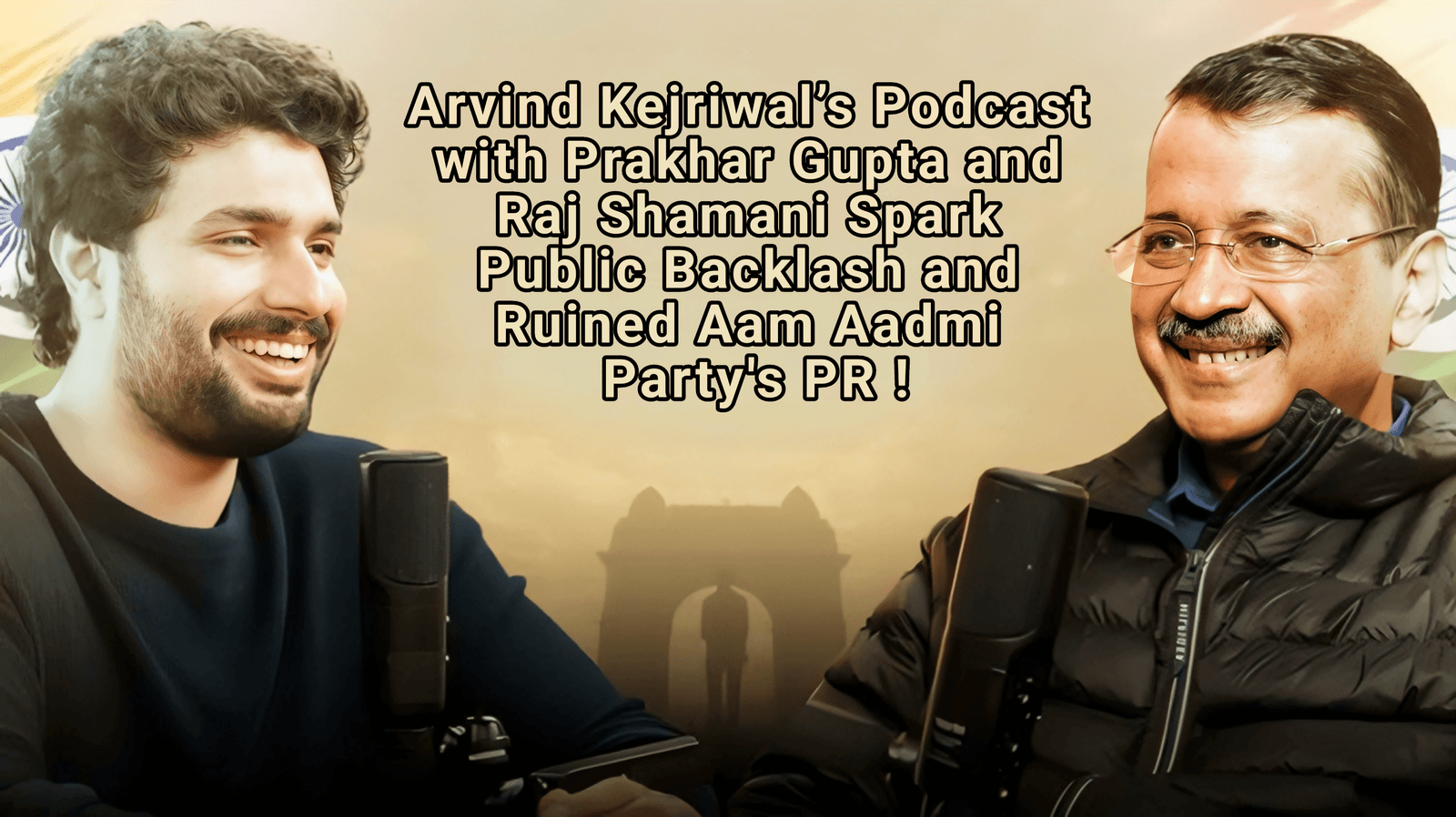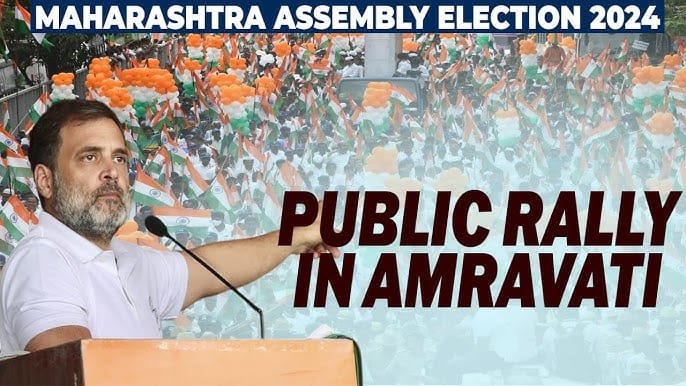The recent podcasts by Arvind Kejriwal was a series of lectures to reach the youth and fine-tune even more the popularity of Aam Aadmi Party.
Kejriwal discussed with Prakhar Gupta his Prakhar Ke Pravachan while with Raj Shamani on one of her shows where he would be questioned against the policies, the promises, and the performance delivered by his governments. The upshot was overt criticism rather than good PR for the party or its leader.
Tough questions from the hosts revealed vulnerabilities in Kejriwal’s governance and inconsistencies in his answers, which raised a storm in the minds of viewers and commentators.
Key Issues Raised in the Podcasts
Kejriwal was questioned about many aspects of governance in Delhi during the podcasts, such as:
1. Yamuna River Pollution
Both podcasts revealed that AAP’s government was not living up to its promise of cleaning the Yamuna River. Even after such great promises, Yamuna remains one of the most polluted rivers in the country.
In many places, the sight of toxic foam and untreated industrial waste could be seen. The viewers felt let down when Kejriwal was not able to provide any clarity on the timeline or strategy to rectify this. It is one of the many examples of AAP’s broken promises.
2. Delhi’s Air Pollution Crisis
Delhi always features in the list of the world’s most polluted cities. Kejriwal was questioned in the debates as to why his government has not taken adequate measures to control air pollution.
The opponents claim that though AAP has emphasized on short-term solutions like the odd-even vehicle scheme, it has failed to take up long-term measures such as developing public transport or checking industrial emissions.
Kejriwal’s responses were perceived as evasive and further alienated viewers.
3. Corruption Scam
The very backbone of AAP is fighting corruption, but the financial scam and corruption charges against the Delhi government are washing away all its sheen. Kejriwal was asked questions about this scam,
but the answers lacked details, leaving the impression that he was fudging instead of facing.
Ad Spending Row
One of the most controversial moments of the podcasts was when Kejriwal denied that he had spent ₹500 crores on advertisements, which he had earlier admitted in public. The AAP government has been accused of spending more on advertisements than governance.
This inconsistency between his earlier statements and his denial on the podcast damaged his credibility, with viewers accusing him of misleading the public.
Massive spending on advertising also indicates resource allocation problems. Critics argue that the money could have been used to solve problems much bigger in scope or more essential, such as improving infrastructures or facilities in hospitals or reducing pollution.
Controversies in ad spending become an emblem of what many consider misplaced priorities under Kejriwal’s leadership.
Freebies Policy: Relief or “Cash for Votes”?
Most of the podcasts spoke of the freebies policy of AAP. Free water, free electricity, and money for the ladies and senior citizens were promises on which much talk was heard. Such schemes,
though immensely popular with one section of the voters, have proven unsustainable and burdensome to the exchequer of Delhi.
The opposition branded the proposed women and elderly-focused financial aid as “cash for votes,” a clear indication that this is a political agenda rather than a sound economic policy. Kejriwal argued that they are necessary policies for the wellbeing of the Delhiites.
Freebies, as critics say, draw attention away from more vital issues such as infrastructure, education, and employment.
Financial Crisis in Delhi
Delhi under AAP governance has been witnessing increased questioning regarding the financial health of the system. Increasing city debt and instances of non-payment of salaries to government employees, teachers, and health workers suggest problems beyond the reach of the existing system.
Concurrently, there is the AAP promise of super expansive social welfare schemes that make for a challenge regarding fiscal sustainability.
Kejriwal defended himself by claiming he is “good in accounts” and can “manage the financials of Delhi very efficiently”,
but repeated pleas by his government to the Centre for financial support have brought such claims to a halt. Critics instead view this as an evidence of fiscal mismanagement and not an evidence of systemic injustice.
Growing Public Discontent
Public opinions in Delhi seem to be changing against AAP as the people are getting really disappointed with unfulfilled promises and governance failures. People criticize for not solving some of the most important issues of the list
1. Infrastructure Development: Many areas of Delhi still do not possess a proper road, sewage system, and waste management facilities.
2. Healthcare and Education: AAP has been praised for the initiative taken by Mohalla Clinics and transformation in schools, but some criticism follows because of being non-scalable or sustainable. Reports of underfunding and incomplete projects have also added to the criticism
3. Employment and Economic Growth: Based on criticism, the AAP did not work towards the initiation of work or the economic development of the city.
This growing anti-incumbency feeling is challenging for AAP especially in the event of elections looming in the future.
Electoral Consequences
The fallout over Kejriwal’s podcast talks will likely have a significant electoral impact on AAP. There is a loss of public trust through Kejriwal’s seeming ducking and dodging of critical issues that do not get a proper resolution and answers at the end.
Meanwhile, scandals and issues involving AAP’s decisions on policy and governance, let alone the kind of management involved in its financial practices, are most likely chasing away the prospective voter, particularly middle-class and government employees.
Reliance of AAP on social welfare programs may prove to be a double-edged sword, as its opponents continue to raise questions about the feasibility of these policies. AAP might find itself in an unimaginable scenario, barely holding on to Delhi if public opinion remains adverse towards it.
Can Kejriwal recuperate?
This is the hour of need for the Arvind Kejriwal leadership. He needs to be able to regain the confidence of the public by making open failures of open governance clear and through practicable solutions and financial responsibility.
AAP would also need to balance welfare with sustainable economic policy in order to avoid further criticism for fiscally irresponsible ways.
Kejriwal’s record of political resilience also suggests that he may still be able to survive these challenges.
However, controversies surrounding his podcasts and the issues of governance that it has thrown open will require an enormous course correction if AAP can regain its lost reputation and electoral prospects.
Stay Connected and Share Your Stories
For all those inspired by stories of resilience and ambition, follow us on X/Twitter and on Instagram . For those with untold stories that you would love to share, please send them to contact@thephilox.com



